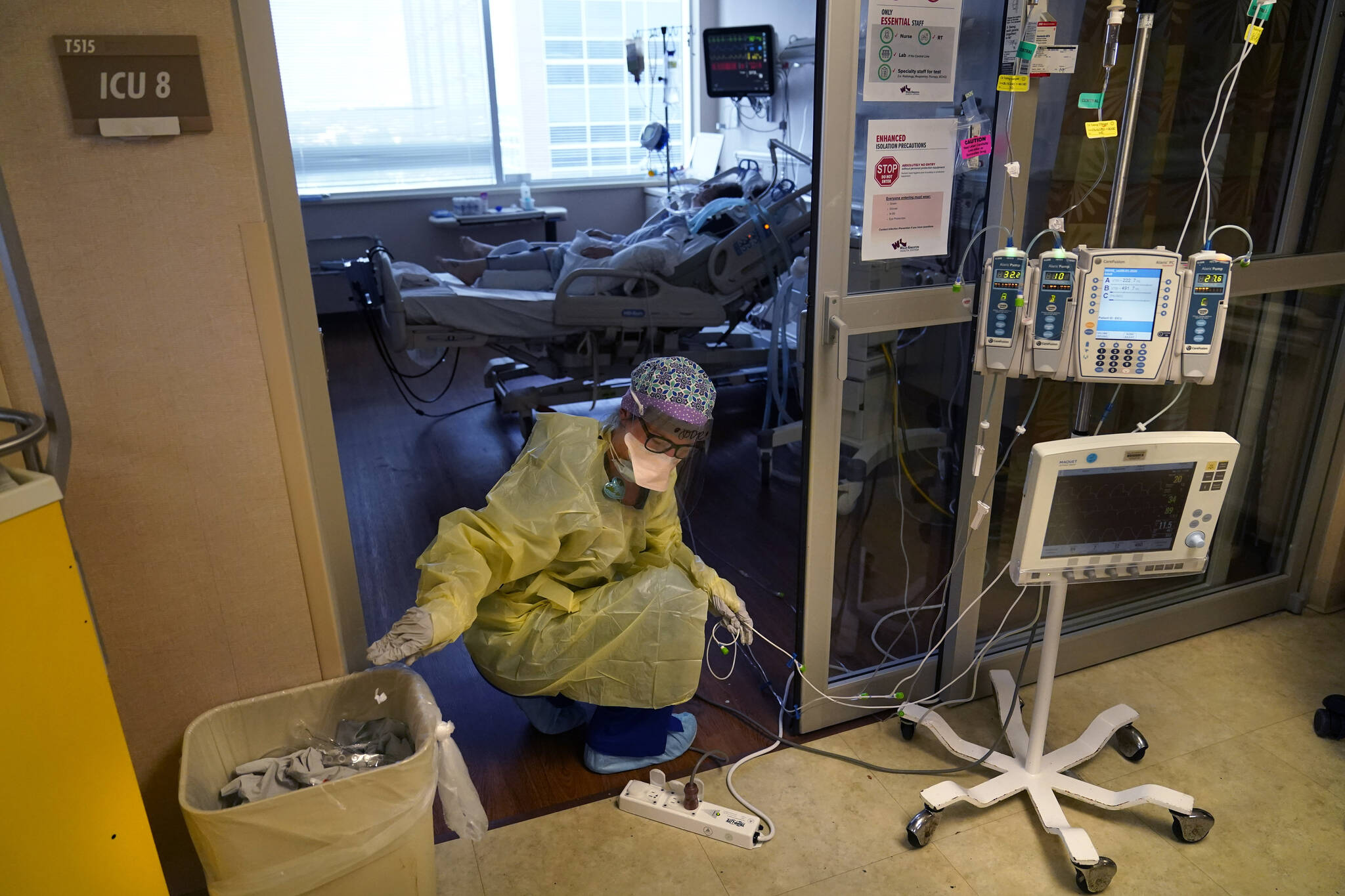Gov. Mike Dunleavy once again amended the call of the current special session of the Alaska State Legislature, this time to allow lawmakers more latitude to address the state’s increasing COVID-19 cases.
In a news conference Thursday, Dr. Anne Zink, the state’s chief medical officer, said the state and many others are facing worker shortages and need flexibility in getting health care workers. Alaska is highly reliant on out-of-state workers, Zink said, and the entire nation is facing a shortage of both personnel and supplies.
“I want to reassure Alaskans emergency departments are not closed,” Zink said. “There may be longer waits, but they’re not closed.”
Zink and other health officials said the number of hospitalizations from COVID-19 continues to rise and is putting continued strain on the state’s health care systems. The rise in cases is primarily attributed to the delta variant of the virus, which is more transmissible and better at evading immunities, according to state epidemiologist Dr. Joe McLaughlin, who said that the state is seeing more vaccinated people in need of hospitalization as well.
Health officials stressed vaccines are the most effective way to prevent contracting and transmitting the virus, but said they understood people’s hesitancy to do so.
“We continue to move at the speed of trust,” Zink said.
The Department of Health and Social Services is partnering with the Alaska Chamber of Commerce to offer weekly prizes to incentivize people to get vaccinated.
At the news conference, Alaska Chamber President and CEO Kati Capozzi said a combination of prizes would be offered to adults who vaccinate or parents of children 12 and older who get their children vaccinated, with a chance to win $49,000. Those who are already vaccinated are eligible for certain prizes as well, Capozzi said. More information about the contest is at GiveAKashot.com.
[Wrangell and Petersburg get text-to-911 service]
The Chamber and DHSS partnered in spring to distribute $1 million to local chambers which was used for local incentive campaigns, said Public Health Director Heidi Hedberg, who said the collaborative effort had helped the initial vaccination campaign.
“We slowly and steadily increasing vaccinations, but we still have a ways to go,” Hedberg said.
State health officials were trying to provide as much information as possible to Alaskans, Zink said, to try and reassure them about the vaccine’s safety, but there was a lot of misinformation to contend with.
Dates and figures
The Food and Drug Administration has given a provisional date of Sept. 20, for people to begin receiving booster doses of the vaccine, said DHSS epidemiologist Matt Bobo, but the state is still waiting on additional guidance. Bobo said it was not yet clear if the FDA intended to authorize boosters for segments of the population like the elderly and health care workers before the general public.
According to state data, 55.3% of the state’s total eligible population is fully vaccinated, meaning it’s been two weeks since their final dose.
The City and Borough of Juneau reported 33 new cases Thursday, 31 of which were residents while the state reported 727 new cases. There are currently five people hospitalized with COVID-19 at Bartlett Regional Hospital, but hospitals in the Anchorage area are experiencing strain.
There are currently 164 people hospitalized with COVID-19 statewide, according to DHSS data, with 97 intensive care unit beds taken up and 25 people on ventilators.
There are breakthrough cases among the hospitalized, McLaughlin said, but the vast majority of hospitalized patients were unvaccinated. Some preliminary data showed that those who have contracted and recovered from COVID-19 may show greater immunity to the virus, but he said COVID-19 also came with significant risk of severe illness requiring hospitalization or even death.
“You’re putting yourself at risk for lots of adverse health effects,” McLaughlin said. “Clearly, it’s much better to get vaccinated.”
Hedberg said insurance was paying for COVID-19 hospitalizations for patients who had it, but for the uninsured the patient would be asked to pay. The Associated Press reported Monday hospitals in Connecticut were calculating COVID-19 costs in the millions of dollars based on a national model from the Kaiser Family Foundation and Peterson Center on Healthcare that approximated the cost of a single COVID-19 admission at $20,000.
In August, Delta Airlines announced employees who declined a COVID-19 vaccine would be charged an additional $200 a month with the company citing the cost of a hospital stay at $50,000, AP reported.
• Contact reporter Peter Segall at psegall@juneauempire.com. Follow him on Twitter at @SegallJnuEmpire.

